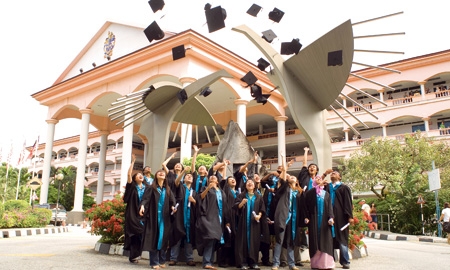
 |  |  |  |  |
| Tan Sri Dato’ Seri Dr Jeffrey Cheah, Chairman and Founder of the Jeffrey Cheah Foundation and Sunway Group ------------- ”We are trying to set a good example of how educational institutions should be run. If [one only] looks for profit, it would be impossible to build good institutions.” | Prof Helen Bartlett, Pro Vice-Chancellor and President of Monash University ------------- ”Education is key to building the knowledge-based economy that will lead Malaysia into becoming a high-income country.” | Johan Mahmood Merican, CEO of TalentCorp ------------- ”By providing the right support, we are sure Malaysians will prove to be a sustainable source of talent that will drive forward the National Key Economic Areas.” | Wan Ahmad Saifuddin, CEO of UNITAR ------------- ”It is essential to be more flexible and interactive. We want to emphasize that e-learning is not just a sideline, but it is actually core to teaching and learning.” | Tunku Tan Sri Imran, Executive Chairman of the Antah Group ------------- ”Many of us were educated in the UK, so there is a natural affinity between Malaysia and the UK.” |
The CEO explains that there are a large number of under-qualified people in the workforce and UNITAR is working to change that by helping companies develop training programs for their current and future employees.
“Recently we have helped the Ministry of Defense by furnishing a high quantity of human capital to work in the civil service, an industry that employs 20 percent of the population,” Mr Saifuddin says.
And yet, however many Malaysians increasingly want a post-secondary education, there are often geographic, cost, and time-related factors that make such training difficult to attain. UNITAR has attempted to address these issues, first by offering some training for free “to get people with technical vocations accessing a higher level of education.”
One of the biggest changes UNITAR has made in the past several years has been to dramatically improve the electronic resources the university offers to students. Mr. Saifuddin says that upon his arrival at UNITAR, he had a lot of work to do when it came to improving e-learning: “I had to upgrade a system that was 15 years old. Today we are focusing on online technology. E-learning in UNITAR has always existed but it was never really highlighted. Now we are relying on it mostly.”
This newfound reliance on e-learning allows the university to provide education from a distance. “The essential need here is to become more flexible and interactive,” Mr. Saifuddin states. “We want to emphasize that e-learning is not just a sideline, but it is actually core to teaching and learning.”
The CEO hopes in-person classroom sessions at one of the university’s 10 regional centers across the country can be used for enriching discussions, rather than simply for communicating basic facts, which students should already have gained through online lectures and e-books.
In order to ensure that students all have the internet access required for the online distance learning program, UNITAR provided each student with a tablet. This was made possible by a partnership between the university and Lenovo. Each year the school gets approximately 4,000 tablets to distribute to students.
Lenovo is not the only major partner helping to improve higher education in Malaysia. The UK has played a significant role in making university more accessible. Malaysia is the largest market for UK transnational higher education provision. This support has meant that today there are almost four times as many Malaysia-based students studying UK higher education programs than Malaysians studying in the UK.
Speaking on the current state of UK-Malaysian relations, Antah Group’s executive chairman believes that bilateral agreements between the UK and Malaysia are a natural fit. “Many of us were educated in the UK, so there is a natural affinity,” says Mr. Tunku. “Malaysians know London better than other cities in the world, and love everything British, from the Premier League to the food.” This affinity may also be to thank for the partnerships helping to make Malaysia an important hub for higher education.
The challenge of building a large and qualified workforce in Malaysia doesn’t end with providing higher education, however. There is still the question of ensuring that students gain the hands-on experience they need in order to manage responsibility in the workforce. There is also the challenge of ensuring that graduates do in fact join the Malaysian workforce despite potentially alluring opportunities abroad, or family commitments at home. That’s where TalentCorp comes in.
TalentCorp organizes several programs intended to strengthen human capital in Malaysia. “A country’s best asset is its people,” says Johan Mahmood Merican, CEO of TalentCorp. “This is why TalentCorp believes in grooming and nurturing Malaysians. By providing them with the right support, we are sure Malaysians themselves will prove to be a sustainable source of talent that will drive forward the National Key Economic Areas.”
The programs run by TalentCorp focus on certain key areas. These include multiple internship programs that help high-achieving graduates gain the experience they need to excel in their careers.
TalentCorp also orchestrates a program called flexWorkLife.my – in partnership with the Ministry of Women, Family and Community Development – in order to support individuals trying to balance work and family. Other TalentCorp programs encourage well qualified Malaysian expatriates to return to their home country, or provide expatriates with ways to contribute to Malaysia’s development while abroad.
0 COMMENTS